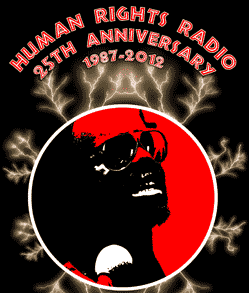 On November 26, 1987, Mbanna Kantako founded WTRA, an unlicensed microradio station broadcasting from the John Jay Homes in Springfield, Illinois.
On November 26, 1987, Mbanna Kantako founded WTRA, an unlicensed microradio station broadcasting from the John Jay Homes in Springfield, Illinois.
Legally blind and in his twenties at the time, Kantako started the station to protest the imminent destruction of the housing project by the city and the pervasive police abuse that occurred there.
WTRA would later be re-named Human Rights Radio to reflect the Kantako family’s widening concern with issues of social injustice.
HRR is widely cited as sparking the modern microradio movement in the United States – an occupation of the airwaves that sought to speak truth to power at both the neighborhood and national levels. In response to this uprising, The FCC created the LPFM service, which itself turns 12 this year.
As a popular phenomenon microradio remains alive and well, considering how hard the FCC struggles to knock it back. In the last quarter-century, agents have visited, fined, and raided Human Rights Radio, most recently in June of last year. (Kantako’s famous for taping and broadcasting his righteous encounters with the law. 2011 found him berating field agent Will Gray about allegations that HRR was “knocking airplanes out of the sky.”) A federal court has even enjoined Kantako – now north of 50 years old – from broadcasting, yet he remains undaunted.
Today, Human Rights Radio serves as the anchor for a bevy of after-school education programs devoted to Springfield’s underprivileged youth. And the station can now be heard globally, thanks to streaming.
The legacy of Human Rights Radio reaches far beyond the Reagan era of its birth, not to mention the FM dial. Quite a touchstone to the power of political fortitude.